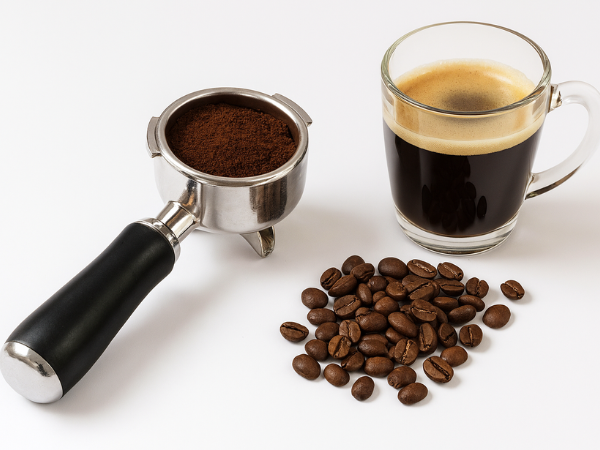Many coffee lovers wonder if filter coffee can be used in an espresso machine. While both start with the same beans, the roast level, grind size, and brewing method are designed for very different results. Putting filter coffee into an espresso machine won’t break it, but the taste and texture may surprise you.
Instead of the thick, creamy shot you expect from espresso beans, filter coffee often produces a lighter, sharper cup with less crema. For some, this creates an interesting twist on flavor; for others, it feels like a compromise.
What Happens When You Use Filter Coffee in an Espresso Machine
Filter coffee beans are typically roasted lighter and ground coarser than espresso beans. When used in an espresso machine, they don’t extract in the same way. The result is often a thinner body, less crema, and a sharper acidity.
Instead of the rich, syrupy shot you expect from espresso beans, you may get a cup that tastes closer to a strong filter brew — bright, aromatic, but lacking depth. This isn’t “wrong,” but it does change the drinking experience.
Key Differences Between Filter Coffee and Espresso Beans
The main differences come down to roast level, grind size, and intended brewing method.
| Aspect | Filter Coffee Beans | Espresso Beans |
|---|---|---|
| Roast | Light to medium, preserves acidity and floral notes | Medium to dark, emphasizes body and sweetness |
| Grind | Coarser, suited for drip or pour‑over | Fine, suited for high‑pressure extraction |
| Flavor | Bright, fruity, tea‑like | Bold, creamy, chocolatey |
| Crema | Minimal | Thick, golden crema |
👉 In short: filter beans are designed for slower brewing methods, while espresso beans are optimized for high‑pressure extraction.
Potential Benefits of Using Filter Coffee in Espresso Brewing
While not traditional, using filter beans in an espresso machine can have some upsides:
- Unique flavors: Fruity or floral notes can shine in a concentrated shot.
- Experimentation: Great for coffee enthusiasts who enjoy testing different profiles.
- Lighter body: Some drinkers prefer a less intense espresso.
- Versatility: Can be used for Americanos or iced espresso drinks where brightness is welcome.
This approach can surprise you with flavors you don’t usually associate with espresso.
Common Drawbacks and Challenges to Expect
Of course, there are trade‑offs when using filter beans in an espresso machine:
- Thin crema: Less oil development means a weaker crema layer.
- Sourness: Light roasts can taste overly acidic under high pressure.
- Inconsistent results: Shots may vary more than with espresso beans.
- Machine strain: Very coarse grinds can cause channeling or uneven extraction.
If you’re after a classic, café‑style espresso, filter beans may leave you disappointed.
Tips to Improve Results with Filter Coffee in an Espresso Machine
If you want to experiment, a few adjustments can help:
- Grind finer than you would for drip, but not as fine as espresso beans.
- Increase dose slightly to add body.
- Adjust temperature higher to extract more sweetness.
- Try ristretto shots (shorter extractions) to reduce sourness.
- Blend beans — mix filter beans with espresso beans for balance.
These tweaks won’t make filter beans identical to espresso beans, but they can improve the cup.
Best Situations to Try Filter Coffee in Your Espresso Maker
Using filter beans in an espresso machine isn’t for every occasion, but it can work well in certain contexts:
- When experimenting: Exploring new flavors and learning extraction.
- For Americanos: Bright, fruity notes translate well when diluted.
- In iced drinks: Acidity can cut through cold milk or ice.
- If you only have filter beans at home: Better to brew than waste.
It’s less about replacing espresso beans and more about expanding your options.
Final Thoughts: Is Filter Coffee Worth Using in an Espresso Machine?
Filter coffee can be used in an espresso machine, but the results will differ from traditional espresso. Expect brighter flavors, less crema, and a lighter body. For purists, espresso beans remain the best choice. For curious drinkers, though, filter beans can open the door to new taste experiences.
Ultimately, it comes down to your goals: if you want café‑style espresso, stick with espresso beans. If you enjoy experimenting and don’t mind a different profile, filter beans can be a fun alternative.

